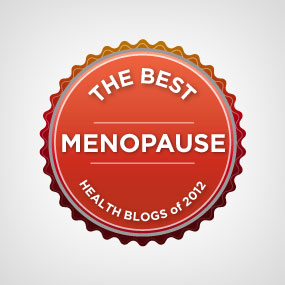Good
Wishing you a Good Pesach, a Good Friday or an all around good weekend.
This photo has been circulating on the interwebz this week. It reminded me of menopause for some reason, because if it’s not one thing, it’s another.
But mostly? I wanted to thank you for reading and supporting Flashfree for the past four years. The blog was voted among the ‘Best of 2012’ this week by Healthline. Check out the others as well; there some great resources out there and I am proud to be among them.
Enjoy and see you on Monday!
Read MoreWednesday Bubble: Hairs and acne and heart/breast conditions. Oh my!
 Back in 2008, I wrote about Intrinsa, a testosterone patch that was tested in a study of 841 postmenopausal not currently on hormone replacement therapy to evaluate effects in terms of improving sexual desire. The results, which were published in the New England Journal of Medicine, showed that compared to a dummy patch, use of low or high dose Intrinsa was associated with significant increases in sexual desire and a decline in sexual distress. Overall, the higher dose patch led to modest improvements in sexual function. In other words, wearing a patch was significantly better than using nothing at all but not life-shattering in terms of improving sexual function.
Back in 2008, I wrote about Intrinsa, a testosterone patch that was tested in a study of 841 postmenopausal not currently on hormone replacement therapy to evaluate effects in terms of improving sexual desire. The results, which were published in the New England Journal of Medicine, showed that compared to a dummy patch, use of low or high dose Intrinsa was associated with significant increases in sexual desire and a decline in sexual distress. Overall, the higher dose patch led to modest improvements in sexual function. In other words, wearing a patch was significantly better than using nothing at all but not life-shattering in terms of improving sexual function.
Once I delved further into androgens and women, I learned that while it has been suggested that local circulating levels of androgens are associated with low sexual desire and sexual dysfunction, the data are contradictory. Moreover, in a fairly recent scientific review, researchers say that no single androgen predicts which women will have sexual dysfunction, making it even harder to address, right? What’s more, they also note that laboratory studies have only limited value and aren’t routinely recommended.
Still, researchers continue to evaluate the role (if any) of testosterone treatment in female sexual dysfunction; the latest study on the dockets is the BLISS trial, which is examining the long-term effects (i.e. 60 months) of a low dose testosterone gel — LibiGel — in natural and surgically-induced menopausal women. This trial was requested by the FDA to insure that testosterone can be safely used without specifically causing heart disease or breast cancer ( note that the focus of this study is specifically on the risk for heart-related events, including death, nonfatal heart attack, nonfatal stroke, chest pain, and clotting events and death, and breast cancer). Importantly, researchers still don’t know much about the safety of long-term testosterone in either men or women, although it is a known precursor of estradiol, a hormone that has been shown to stimulate breast tissue. With regard to heart issues, women with polycystic ovarian syndrome have elevated blood testosterone levels and are at risk for obesity, high blood pressure and insulin resistance, all signs of heart disease.
Although questions about heart disease and breast cancer remain unanswered, experts have evaluated numerous formulations of androgens like testosterone, e.g. patches, oral tablets, implants and injections, and say that the major side effects are unwanted hair growth and acne. Both are related to dose and how long treatment lasts, and disappear once treatment is stopped. And while rates of hair growth are definitely lower for patches in general (as few as 7% to as high as 23%), as many as 36% of women who use oral testosterone have unwanted hair growth. Among those receiving implants, pellets or injections the number is also high: 20%.
Let’s face it; the trouble is testosterone is that it may only address a miniscule amount of factors affecting a woman’s libido and in literally leave a trail in its place, not only of unwanted hair and blemishes, but perhaps more serious issues. What do you think? Is testosterone a hairy proposition? Should the bearded lady shave before her handler pushes more patches and gel?
Stay tuned…
Read More
Newsflash: Estrogen only joins “avoid long-term hormone therapy use” recommendations
How many times does one need to get hit over the head before they have that “ah-ha” moment?
That’s pretty much the party line when it comes to hormone replacement therapy, or HRT. I’ve been writing about HRT since I started this blog. And I have been reading study after study that ultimately come to the same conclusion: long-term use of any hormones is unsafe.
I know that there are naysayers out there who don’t want to believe. Even the International Menopause Society continues to dispute the link between combined hormones and breast cancer. Yet, I wholeheartedly believe in free will and choice, informed decision-making needs to lead the way when it comes to your health.
And so, in the latest wrench to be thrown into the HRT argument, researchers from Brigham and Women’s Hospital in Boston, reporting from the annual American Association for Cancer Research meeting, that the longer that any hormone replacement is used, regardless of whether or not it is estrogen plus progesterone or estrogen alone, the higher the risk for developing breast cancer.
Did you read that?
Lead researcher Wendy Y Chen is quoted in the Association’s newsrelease as saying that while it’s “already been confirmed that patients shouldn’t be undergoing estrogen plus progesteron hormone therapy for the long term,” (you can read about that here), “what we found is that people should also be careful about longer-term use of estrogen-alone [hormone therapy].”
Chen and her team evaluated data collected during the Nurses Health Study over a period of 28 years. They found that of the 121,700 women who took part in the study who were between the ages of 30 and 55 in 1976, and used combined hormones for 10 to 14.9 years, had an 88% higher risk of developing breast cancer than women who did not use HRT. Moreover, this risk increased to more than two-fold in women using it up to almost 20 years. And although the risk was comparatively lower for women who used estrogen only, they still had an 22% increased risk for up to 14.9 years and a 43% increased risk for up to 20 years compared to non-users.
Importantly, when the researchers restricted the population to the same that was observed in the Women’s Health Initiative study (i.e. healthy, active postmenopausal women ages 50 to 79 with an intact uterus), they observed a decline in breast cancer risk among women who used estrogen only therapy for less than five years but continued to observe an increased risk among women currently using estrogen fo 15 to 20 years.
Chen emphasizes that the data do not demonstrate an increased risk for dying from, although they continue to study this particular factor for additional clues.
So, what’s the upshot?
Long-term use of any kind of hormone therapy, estrogen alone or in combination with progesterone, significantly increases the risk for developing breast cancer. Is this increased risk worth a decline in hot flashes, night sweats, mood swings and vaginal dryness? Only you can decide.
Read More









